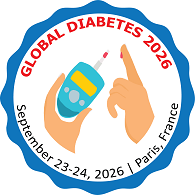Welcome Message
Welcome to the 24th Global Conference on Diabetes, Endocrinology and Primary Healthcare
We are pleased to welcome you to join us on September 23-24, 2026, in the captivating city of Paris, France, for an engaging and impactful global forum. This conference promises to unite distinguished clinicians, researchers, academics, and primary care experts to share pioneering developments in diabetes, endocrine science, and integrated healthcare.
Experience two days of thought-provoking sessions, collaborative networking, and innovative solutions aimed at transforming patient care and health outcomes. We look forward to your valued participation in this dynamic exchange of knowledge and ideas!
About the Conference
The 24th Global Conference on Diabetes, Endocrinology and Primary Healthcare, taking place on September 23-24, 2026, in Paris, France, is designed to convene a global network of endocrinologists, diabetologists, primary care physicians, researchers, and healthcare innovators. This prestigious gathering will spotlight cutting-edge research, emerging treatment strategies, and multidisciplinary approaches for managing diabetes and endocrine disorders in both clinical and community settings.
The conference will deliver a dynamic scientific program featuring keynote lectures, expert-led panel discussions, hands-on workshops, and oral and poster presentations. Topics will span a broad range—from advances in metabolic science and hormone regulation to integrative approaches in primary healthcare and chronic disease prevention. Attendees will benefit from evidence-based insights and practical strategies that elevate patient outcomes and support sustainable healthcare delivery.
A core focus of this event is to foster collaborative dialogue among academic, clinical, and industry leaders. It will also provide an exclusive platform to explore innovative technologies, precision medicine, and policy-driven solutions that are shaping the next era of endocrine and diabetes care.
Join us in the heart of Paris for this transformative conference experience—where global minds meet, innovations unfold, and partnerships pave the path to improved health and well-being for patients worldwide.
Conference Highlights:
-
Keynote presentations by global leaders in endocrinology, diabetes, and primary care
-
In-depth discussions on metabolic diseases, precision therapies, and digital health tools
-
Focused sessions on patient-centered care, prevention strategies, and healthcare delivery
-
Research presentations in oral and poster formats
-
Dedicated workshops to enhance clinical and practical knowledge
Networking Opportunities:
Connect with a diverse community of professionals from across disciplines. Exchange ideas, explore collaborative projects, and gain exposure to novel solutions and best practices in diabetes and endocrine healthcare. The poster session will offer an engaging platform for researchers to present their latest work and receive feedback from peers and thought leaders.
Who Should Attend?
The 24th Global Conference on Diabetes, Endocrinology and Primary Healthcare, scheduled for September 23-24, 2026, in Paris, France, is curated to attract a wide spectrum of professionals involved in endocrine and metabolic health, diabetes care, and primary healthcare delivery. The conference serves as an essential meeting ground for knowledge sharing, skill enhancement, and collaborative exploration across disciplines.
Target Audience Includes:
-
Endocrinologists
-
Diabetologists
-
Family Medicine and Primary Care Physicians
-
Pediatric Endocrinologists
-
Clinical Researchers and Medical Scientists
-
Healthcare Professionals and General Practitioners
-
Academic Faculty and Medical Scholars
-
Medical and Nursing Students, Interns, and Trainees
-
Pharmaceutical and Medical Device Industry Representatives
-
Health Policy Makers and Regulatory Authorities
-
Diabetes Educators and Lifestyle Coaches
-
Registered Dietitians and Clinical Nutritionists
-
Nurses and Allied Health Practitioners
-
Biotechnology and Diagnostic Laboratory Experts
This global forum provides a unique opportunity to engage with interdisciplinary experts, present breakthrough research, discover emerging technologies, and build lasting collaborations that advance patient care and healthcare innovation in endocrinology, diabetes, and primary health services.
Why Should Attend?
The 24th Global Conference on Diabetes, Endocrinology and Primary Healthcare, taking place on September 23-24, 2026 in Paris, France, offers a unique opportunity for healthcare professionals, researchers, and industry stakeholders to explore the latest breakthroughs in diabetes and endocrine care. The program features inspiring keynote talks, in-depth sessions, and practical workshops led by global experts, designed to equip attendees with actionable insights and forward-looking strategies for clinical and research excellence.
Beyond academic enrichment, the conference fosters meaningful networking opportunities with peers, thought leaders, and innovators from around the world. Attendees will gain access to cutting-edge technologies, pharmaceutical advancements, and diagnostic tools showcased by leading companies. With the added benefit of CME/CPD accreditation, this event supports both professional development and collaborative progress in shaping the future of global healthcare.
Session & Tracks
1. Cardio-Endocrine Interplay
Hormonal imbalances can significantly influence cardiovascular health, increasing risks of conditions such as hypertension, dyslipidemia, and atherosclerosis. This session will explore the complex interplay between endocrine disorders and cardiac function, including the role of insulin resistance, thyroid dysfunction, and adrenal imbalances. Experts will present new research on cardiovascular biomarkers, integrated diagnostic approaches, and effective treatment strategies. Discussions will also cover lifestyle interventions, pharmacological therapies, and prevention of long-term cardiovascular complications in endocrine patients.
2. Genomic Advances in Endocrine Disorders
With advancements in genetics and molecular biology, the diagnosis and treatment of endocrine diseases are becoming increasingly precise. This session will highlight the role of gene mutations, epigenetics, and hereditary syndromes in endocrine pathologies. Presentations will cover tools like whole genome sequencing, molecular diagnostics, and emerging gene-editing technologies. Case studies will show how precision medicine can improve treatment outcomes. The session also explores ethical challenges and the future potential of personalized endocrinology.
3. Disorders of Bone and Mineral Metabolism
This session focuses on endocrine regulation of calcium, phosphate, and bone metabolism, which is crucial for maintaining skeletal health. Experts will discuss disorders such as osteoporosis, osteomalacia, rickets, and hyperparathyroidism. Topics include hormonal influences on bone density, the role of vitamin D, and advances in dual-energy X-ray absorptiometry (DEXA). Presenters will explore new pharmacological therapies and long-term management strategies to prevent fractures and improve bone strength, particularly in aging populations.
4. Endocrine Health in Women
Women face unique endocrine challenges across different life stages, including puberty, fertility, pregnancy, and menopause. This session will address conditions such as polycystic ovary syndrome (PCOS), thyroid dysfunction, hormonal imbalances during pregnancy, and menopausal transition. Presentations will focus on gender-specific diagnostics, individualized treatment plans, and hormone replacement therapies. Experts will also explore the psychosocial impact of these disorders and new advances in reproductive endocrinology and women’s wellness.
5. Hormonal Changes in Aging Populations
As people age, significant hormonal changes can lead to conditions such as andropause, osteoporosis, diabetes, and metabolic syndrome. This session explores how aging affects the endocrine system and its impact on quality of life, cognition, and physical health. Presenters will discuss hormone-based interventions, aging biomarkers, and tailored therapies for elderly patients. Emphasis will be placed on healthy aging, disease prevention, and optimizing endocrine care in geriatric medicine through a multidisciplinary approach.
6. Managing Rare Endocrine Diseases
Rare endocrine disorders such as Addison’s disease, acromegaly, and Cushing’s syndrome often pose diagnostic and treatment challenges due to their subtle and overlapping symptoms. This session will highlight strategies for early detection, genetic underpinnings, and the importance of clinical awareness. Case reports and expert insights will be shared to guide diagnosis and long-term management. Discussions will also address patient-centered care, novel therapies, and international guidelines for handling low-prevalence endocrine diseases.
7. Nutrition and Endocrine Wellness
Nutritional balance plays a fundamental role in preventing and managing endocrine disorders like obesity, metabolic syndrome, and thyroid dysfunction. This session will present evidence-based dietary protocols, functional foods, and nutrient-focused interventions. Attendees will explore the role of gut microbiota, intermittent fasting, and anti-inflammatory diets in endocrine regulation. The track aims to bridge clinical endocrinology with nutritional science for optimized patient outcomes.
8. Advances in Endocrine Pharmacology
This session explores cutting-edge developments in hormone-based medications, including synthetic analogs, slow-release formulations, and biosimilars. Experts will discuss pharmacokinetics, safety monitoring, and drug adherence strategies for chronic endocrine disorders. Case studies will illustrate personalized dosing regimens and polypharmacy management. The session also highlights new clinical trials and regulatory insights shaping endocrine drug innovation.
9. Autoimmunity and the Endocrine System
Autoimmune conditions are central to several endocrine disorders, including Type 1 diabetes, Graves’ disease, and autoimmune thyroiditis. This session focuses on the immunopathology behind these conditions and evolving diagnostic biomarkers. Presenters will explore immunotherapy, tolerance induction strategies, and autoimmune risk prediction. Attendees will gain a deeper understanding of immune-endocrine interactions and new therapeutic approaches targeting immune dysfunction.
10. Hormones in Cancer Development and Therapy
Certain cancers are driven by hormonal imbalances and receptor activity, including breast, prostate, and thyroid cancers. This session will delve into the mechanisms of hormone-driven carcinogenesis, early detection through molecular profiling, and hormone receptor modulation. Presentations will cover the use of endocrine therapies in cancer treatment and the promise of precision oncology. Experts will also explore survivorship issues and endocrine complications in cancer patients.
11. Critical Endocrine Care in Acute Settings
Critically ill patients often exhibit endocrine disturbances that require urgent attention, such as adrenal crises, thyroid storms, and severe hyperglycemia. This session will explore endocrine emergencies in ICU settings, diagnostic red flags, and clinical protocols for timely intervention. Speakers will present evidence-based strategies and real-life scenarios to guide endocrine management in acute care environments. Multidisciplinary collaboration in emergency and critical care will also be discussed.
12. Infectious Diseases and Endocrine Dysfunction
The COVID-19 pandemic and other viral infections have shed light on their potential to disrupt endocrine systems. This session explores how viral illnesses trigger or exacerbate conditions like diabetes, adrenal insufficiency, and pituitary dysfunction. Presentations will cover clinical findings, diagnostic markers, and post-infectious management guidelines. Experts will also address endocrine follow-up for recovered patients and the role of vaccination in endocrine disease prevention.
13. Endocrine Care in Gender-Affirming Therapy
Hormonal therapy is a cornerstone of care for transgender and gender-diverse individuals. This session will cover protocols for estrogen and testosterone therapy, monitoring hormone levels, and managing side effects. Discussions will also include fertility preservation, mental health support, and long-term risks. Emphasis will be placed on providing safe, respectful, and evidence-based endocrine care within a gender-affirming framework.
14. Novel Therapeutic Frontiers in Endocrinology
From monoclonal antibodies to smart drug delivery systems, new therapies are revolutionizing endocrine care. This session will spotlight innovative hormone therapies, peptide analogs, and nanotechnology applications. Presenters will share the latest clinical trial results and discuss the integration of these therapies into practice. Challenges in access, affordability, and real-world effectiveness will also be addressed.
15. Hormones and Sleep Regulation
Endocrine imbalances significantly affect sleep health, contributing to disorders such as insomnia, sleep apnea, and disrupted circadian rhythms. This session examines the hormonal regulation of sleep through cortisol, melatonin, and insulin pathways. Speakers will discuss how treating endocrine conditions can improve sleep quality and vice versa. Evidence-based strategies and sleep-focused endocrine evaluations will be explored.
16. Neuroendocrine Response to Trauma and Stress
The body’s stress response involves complex neuroendocrine interactions, especially within the hypothalamic-pituitary-adrenal (HPA) axis. This session will examine how trauma, chronic stress, and psychiatric conditions lead to cortisol imbalances, adrenal fatigue, and thyroid disturbances. Emphasis will be placed on treatment approaches combining endocrinology, psychiatry, and stress management therapies.
17. Hormonal Impact of Chronic Disease
Endocrine disorders often arise secondary to chronic illnesses such as kidney failure, liver cirrhosis, or heart disease. This session explores the bidirectional relationship between endocrine health and chronic systemic conditions. Topics include metabolic bone disease in CKD, thyroid dysfunction in liver failure, and diabetes in cardiac patients. Integrated care models and monitoring protocols will be highlighted.
18. Endocrine Perspectives on Obesity
Obesity involves more than excess weight—it’s a hormonal and metabolic disorder influenced by insulin resistance, leptin dysfunction, and adipokine imbalance. This session addresses the pathophysiology of obesity from an endocrine viewpoint. Experts will discuss surgical and pharmacological interventions, appetite regulation, and hormone-based weight loss strategies. Lifestyle modification tools and behavioral approaches will also be explored.
19. Pathological Insights in Endocrinology
Endocrine pathology plays a critical role in diagnosing tumors and other glandular abnormalities. This session will explore histological techniques, cytopathology, and molecular diagnostic tools. Discussions will focus on thyroid nodules, adrenal tumors, pituitary adenomas, and pancreatic neuroendocrine tumors. The integration of pathology with imaging and genomics for precise treatment planning will also be emphasized.
20. Endocrine Disorders in Children and Adolescents
Pediatric endocrine disorders, including growth hormone deficiency, congenital hypothyroidism, and early-onset diabetes, require timely and specialized care. This session focuses on early detection, pediatric hormone therapies, and developmental outcomes. Experts will also address genetic screening, family counseling, and transition planning from pediatric to adult endocrine care. The session aims to enhance long-term quality of life for young patients.
Participation & Presentation Opportunities
The 24th Global Conference on Diabetes, Endocrinology and Primary Healthcare offers a variety of avenues for active engagement—whether you're a seasoned expert, early-career researcher, or industry professional. From presenting your latest findings to networking with global peers, this event is designed to foster meaningful collaboration and knowledge sharing.
Ways to Participate:
Oral & Poster Presentations
present your clinical studies, case reports, or scientific research in engaging oral sessions or visually impactful poster displays. These formats promote direct interaction, constructive feedback, and professional recognition.
Virtual & E-Poster Presentations
Can’t travel to Paris? Join remotely with live-streamed presentations or submit an e-poster for virtual exhibition, ensuring your research reaches a global audience.
Keynote & Invited Talks
Be a voice of authority by delivering high-impact presentations as a keynote or invited speaker. Share your expertise, set the tone for discussions, and inspire attendees from around the world.
Delegate Participation
Attend the event in person to gain access to all sessions, engage in Q&A discussions, and connect with academics, clinicians, and innovators in endocrinology and primary healthcare.
Workshops & Symposia
Host or lead specialized sessions focusing on hands-on learning or in-depth exploration of niche topics. Propose a symposium or workshop to drive thought leadership in your area of expertise.
Exhibitor & Sponsorship Opportunities
Showcase your organization’s solutions, technologies, or research tools to a targeted audience. Engage face-to-face with decision-makers and enhance brand visibility through tailored sponsorship packages.
Young Researcher Forum
Emerging researchers and students can present their early-stage work, gain mentorship from senior scientists, and build visibility in the global endocrinology community.
Panelist / Moderator Roles
Guide discussions, chair sessions, or join expert panels to contribute perspectives on pressing issues and facilitate interactive dialogue among attendees.
Virtual Access & Engagement
Participate from anywhere in the world with access to live sessions, networking lounges, on-demand content, and digital certification.
How to Get Involved:
-
Register as an Attendee: Secure your spot and enjoy full access to the scientific program and networking sessions.
-
Submit Your Abstract: Share your research with a global audience and receive international recognition.
-
Apply as a Speaker: Lead the conversation by presenting as a keynote or session speaker.
-
Propose a Workshop/Symposium: Take initiative to lead an engaging, solution-driven discussion.
-
Become an Exhibitor or Sponsor: Increase your outreach and connect with top-tier professionals.
-
Volunteer for the Event: Support the organizing team and gain behind-the-scenes experience.
Take the next step and be part of this impactful event in Paris, France, on September 23–24, 2026. Whether you’re looking to present, learn, or connect, there’s a place for you at the forefront of diabetes and endocrine innovation.
Market Analysis
The global diabetes and endocrinology market in 2026 is witnessing accelerated growth, driven by the rising prevalence of metabolic disorders, aging populations, and advancements in diagnostics, therapeutics, and digital health. With diabetes alone affecting over 530 million people worldwide, there is increasing demand for technologies such as continuous glucose monitoring (CGM), AI-assisted diagnostics, and tele-endocrinology platforms. The market for diabetes and endocrine care—including devices, hormone therapies, and biosimilars—is expected to exceed USD 100 billion, fueled by innovation in personalized medicine, digital therapeutics, and preventive healthcare strategies. As care delivery shifts toward integrated, patient-centered models, this rapidly evolving landscape offers significant opportunities for clinicians, researchers, and industry leaders alike.

Here is a line graph showing the projected growth of the global diabetes and endocrinology market from 2020 to 2026, highlighting a steady increase toward an estimated USD 105 billion by 2026. Let me know if you'd like to add a regional breakdown or trend line comparison.











